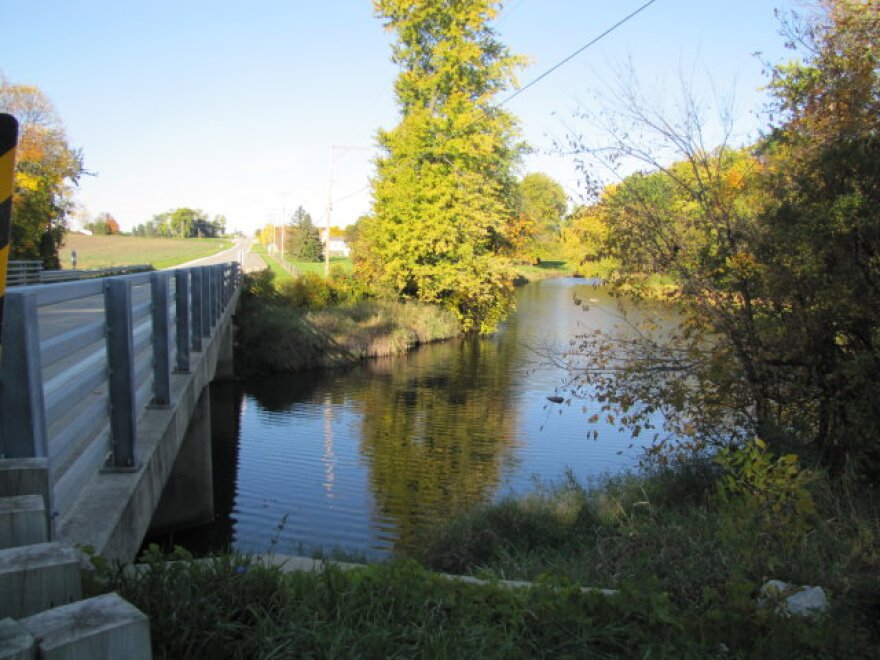Waukesha seems to have moved a step closer to solving its contaminated drinking water issue. With the city's apparent deal with Oak Creek, some people are left with more questions than answers.
News – last week – that Oak Creek is willing to share its Great Lakes tap with Waukesha, has brought new twists to the debate.
Waukesha needs a clean source of water by 2018, to replace its radium-tainted underground supply. Issues the proposed agreement has raised, include the pathway Waukesha would use to return treated wastewater to Lake Michigan.
Under the tentative deal, the vehicle would be the Root River.
WUWM dips into a conversation with a group formed to protect the river.
As far as Susan Greenfield is concerned, news that Waukesha might return treated wastewater via the Root River – could not come at a worse time.
She's executive director of a grassroots group called Root Pike WIN.
It emerged through a DNR push in 2000 to protect watersheds, and has since been drafting a comprehensive plan – along with a collection of other agencies- to restore the river.
"So there are studies underway, water quality monitoring, in some cases, in locations on the river that have never been monitored before," Greenfield says.
After years of work, Greenfield says the plan is five meetings shy of implementation.
"What the study is doing is going to help us identify what the most serious problems are so that we can really target the efforts throughout the Root River," Greenfield says.
We're standing midway along the rivers' meandering course – off Hwy 38 on 5 Mile Road.
"It's a great place to throw in a kayak or a canoe and just head down the river," Greenfield says.
The watershed embraces 117 miles of streams connecting portions of Waukesha, Milwaukee and Racine counties.
The Root River spills into Lake Michigan in Racine's downtown harbor.
Just like other waterways in the region, Greenfield says farming and development have altered its original character.
"Suffering from a great deal of polluted storm water run-off - we need to do a better job now managing now what we call nonpoint pollution," Greenfield says.
What Greenfield says she has also seen, are communities working quietly to alter their storm water impacts on the river.
"Racine County conservationist has been working for years working with farmers to put in buffers and other practices that reduce the runoff coming off of farmland. We just need more of it," Greenfield says.
On the urban side, she sites modification the Village of Greendale has made to a major thoroughfare.
"Grange Avenue was rebuilt with essential rain gardens going down the middle of it and the road was built to slope toward that," Greenfield says.
And the upcoming completion of a "car park" in Franklin.
"Milwaukee County will be building a parking lot that's porous pavement at the sports complex very near the river and point of that of course is to infiltrate water and keep it from running off the parking lot and carrying pollutants into the river," Greenfield says.
Greenfield believes the trick to maintaining momentum hinges on "perception."
"The river is in fact cleaner, but also people's perception of the river has changed when they see it as an important artery in our community," Greenfield says.
The river advocate fears residents could lose heart, if Waukesha receives the green light to use the river to return up to 11 million gallons of treated water water a day on its return trip to Lake Michigan.

"I personally don't think it should be returned through a natural waterway at all, but my board of directors has not taken a stand one way or another. They want to see what the environmental impact study says and I think that's probably a good thing for all of us to do and to be engaged in the public meetings that will take place and make sure that there's good science and good data being used to make a recommendation," Greenfield says.
For instance, Greenfield wants evidence to support recent assertions that more water in the Root River would improve its quality.
"You know we're seeing big changes really in precipitation in this region – we're getting wetter; we're having more severe storms, so that needs to be factored into the environment impact study. And certainly when they have public hearings is something I will want to make sure is factored in," Greenfield says.
She admits this would not be the first time a water utility would pour its wastewater into a river.
So she's keen to dig into case studies from other places where it's happening.
"Tell us about those other rivers and how that turned out because we're talking about an 80 year agreement," Greenfield says.
Greenfield says she'd like to think Wisconsin can learn lessons, before making a final decision on Waukesha's water plans.



